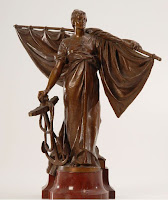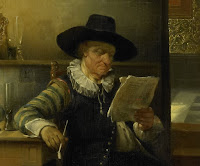| FRYAS |
Nederlands
|
English
|
Deutsch
|
| VR.TÁLA |
vertalen, vertellen
|
translate, interpret, tell, narrate, relate, recite, rede, report, explain
|
übersetzen, erzählen, usw.
|
VR
|
over, oer-, ver-
|
over, for, about, primordial
|
über, ober, ur, usw. |
TÁLA, TAL(E)
|
taal, talen, tellingen, spreken, enz.
|
language(s), tales, speak, etc.
|
Sprachen, Zahlen, Geschichten, usw.
|
Fragments in Codex Oera Linda (2022)
(included are fragments with the derivative TÀLLINGA/ TELLINGA: tales, stories, narrations, narratives)
[004/25] MÀN MOT TÁLA HJAM FON THA WICHARDA ÀND [005] FON HJARA WICHANDLIKA DÉDUM. AK WRA FÀRA SÉ.TOCHTA.
Tell them of the heroes, [005] of their heroic deeds and of distant sea voyages.
[005/01] AL THISSA TÀLLINGA HAGATH DÉN TO WERTHANDE BY THÉRE HÉRD. VPPA HÉM ÀND HWÉR.ET WÉSA MÉI. SÁ BY BLÍSKIP AS BÍ TARUM.
These tales must be told at the hearth, outdoors or anywhere else, in times of joy or tears.
[038/10] HJA KÉTHON ALLERWÉIKES RÉDJÉVINGA. THÉR HJU NIMMER JÉVEN HÉDE. ÀND TÀLADON WONDERA. THÉR HJU NA DÉN HÉDE.
They announced counsels everywhere that she had never given, and related miracles that she had never performed.
[077/20] TO FÁRA WRDON ALLE SÉKUM BINN ÁTHÉNJA IN VSA TÁL BITHONGON ÁFTERNÉI MOSTET IN BÉDE TÁLA SKÉN [25] ÀND TO LESTA ALLÉNA INTHA LANDIS TAL.
Formerly, all cases in Athenia were pleaded in our language, but afterwards it had to be in both languages, and at last in the native language only.
[108/20] THA GRÍSA JEFTHA GRÉVA MOTON LÉRA HJAM. RJUCHT ÀND PLICHT. SÉDKUNDA KRÛDKUNDA HÉLKUNDA. SKÉDNESA TELLINGA ÀND SANGA BIJUNKA ALLERLÉJA THINGA THÉR HJAM NÉDLIK SEND [25] VMBE RÉD TO JÉVANE.
The grey or aldermen must teach them justice and duty, knowledge of seeds, herbs and healing, histories, tales, songs and anything else they may need for giving advice.
[133/25] THRVCH TÁL ÀND OMMEGANG KÉM.ET ÛT THAT WI ALLE BÉDE FON A.DEL.A HIS FOLK WÉRON. THÁ KÉM LJAFDE ÀND ÀFTERNÉI [30] SEND WI MAN ÀND WIF WRDEN.
Our tales and our interactions with one another made it clear to us that we both were Adela’s folk. That is how we came to fall in love and subsequently become man and wife.
[134/01] THÁ.K NÉI THA SAXANA MARKA [5] FOR. HÀV IK THRJU BOKA HRET. THET BOK THÉRA SANGA. THÉRA TELLINGA ÀND THET HÉLÉNA BOK.
When I went to the Saxonmarks, I saved three books. The Book of Songs, the Book of Tales, and the Healing Book.
[146/10] MEN KAVCH IS AK WAN.FRYA.S ÀND MOT KÁP WÉSA. MEN KVADE TÁLE HÀVON HJA MAR MITH [15] BROCHT AS GODE SÉDA.
‘Kauch’ is also poor Fryas, and should be ‘Kaep’; they brought more degenerate language than good morals.
[152/20] FRISO WÉT THA HRENKA THÉRA GOLUM HWAMHIS TÁLE HI SPRÉKTH. HI KÀN THUS ÀJEN HJARA LESTUM WÁKA.
Friso knows the tricks of the Gools and he speaks their language, so he can beware of their schemes.
[154/20]
SIN ÉROSTE SVNV THÉR HI HIR WON BY SWÉT.HIRTE SIN WIF. HETH. ER
BISTONDA A.DEL HÉTEN. ÀND AFSKÉN [25] HI KÀMPADE MITH AL SIN WELD. VMBE
NÉNE BURGA TO FORSTÀLANE NER WITHER VP TO BVWANDE. THACH SAND HI A.DEL
NÉI THÉRE BURCH ET TEX. LAND TILTHJU HI DIGER BI DIGER KVD WERTHA [30]
MACHTA. MITH ELLA HWAT TO VSA ÉWA TÁLE ÀND SEDUM HÉRETH.
He
instantly named his first son — born here by his wife Sweethirte —
Adel, and although he resisted with all his power the restoration or
rebuilding of burgs, he still sent his son Adel to the burg at Texland,
in order to get him thoroughly acquainted with all that belongs to our laws, language and morals.
[158/10] THÁ WR.ALDA BERN JEF ANTHA MODERA FON THÀT MÀNNISKELIK SLACHTE THÁ LÉIDER ÉNE TÁLE IN ALLER TONGA ÀND VP ALLER LIPPA.
“When Wralda gave children to the mothers of mankind, he laid one language in all tongues and on all lips.
[159/01] NÉIDAM VSA TÁLE THUS TO LUK ÀND TO SÉLIGHÉD WÉJATH. ÀND THUS MITH WÁKTH ÀJEN THA BOSA NÍGONGA THÉRVMBE IS HJU [5] MITH ALLE RJUCHT GOD.IS TÁLE HÉTEN. ÀND ALLE THA JENA HWAM HJA AN ÉRE HALDA HÀVATH THÉR GÔME FON.
Because our language thus leads to luck and happiness, and helps beware of evil inclinations, its name ‘God’s language’ is fully justified, and all those who hold it in honor, benefit from it.
[159/15] IN HJARA TSJOD.IS.HÉD SEND HJA TO GVNGEN ÀND HÀVON ÔTHERA TÁLA FORSVNNEN TILTHJU HJA HÉMLIK MACHTE SPRÉKA IN [20] ÀJENWARTHA FON ALREK ÔTHERUM. VR ALLE BOSA THINGA ÀND VR ALLE VNWÉRTHLIKA THINGA
In their wickedness, they have invented different languages, so as to be able to speak secretly in the presence of others about all evil things and about all unworthy things,
SVNDER THÀT STEMLÉTH HJAM VRRÉDA MOCHT NACH SKÁMRÁD HJARA GELÁT VRDERVA.
without a stammer betraying them, or a blush tainting their faces.
[160/01] THA LODDERIGA MAN’GÉRTNE AND THA VNMÀNLIKA KNÁPA THÉR MITHA WLA PRESTERUM ÀND FORSTUM HORADON VNTLVKADON THA NYA TÁLA AN HJARA [5] BOLA.
[160] The dissolute girls and unmanly boys, who prostituted themselves to the vile priests and princes, elicited the new languages from their bed partners.
[160/05] THERWISA SEND HJA FORTH KVMEN ÉMONG THA FOLKRUM TILTHJU HJA GOD.IS TÁLE GLÁD VRJETTEN HÀVE.
That is how they spread among the peoples, until they altogether forgot God’s language.
[160/20] HÉDE HJA NV MÁR ÉNE TÁLE FORSVNNEN. MÜGLIK WAS.T THÀN JET EN LITH GOD GVNGEN. MEN HJA HÀVON ALSA [25] FÉLO TÁLA UTFONDEN AS THÉR STÁTA SEND. THÉRTHRVCH MÉI THAT ÉNE FOLK THÀT ÔRE FOLK ÉVIN MIN FORSTÁN AS THJU KV THENE HVND ÀND THI WOLF THÀT SKÉP.
If they had only invented one language, things might possibly have still gone on well, but they contrived as many languages as there are states, so that one folk can understand another folk just as little as the cow the dog, or the wolf the sheep.
[161/05] BIST THV ALSA GÍRICH THAT THV JRTHA ALLÉNA ERVA WILSTE ALSA ACHST THV NIMMER MÁRE NÉN ÔRE TÁLE OVIR THINA [10] WÉRA NI KVMA TO LÉTANE AS GOD.IS TÁLE. ÀND THÀN ACHST THV TO NJODANE TILTHJU THIN ÀJN TÁLE FRÍ FON UTHÉMEDA KLINNA BILÍWETH.
If it is your desire to be the only heir of Earth, you ought to never again let any other language pass your lips but God’s language, and you ought to make sure that your own language remains free from foreign sounds.
[161/15] THJU TÁLE THÉRA ÁST.SKÉN.LANDAR IS THRVCH THA WLA MAGJARA VRBRÛD. THJU TÁLE THÉRA KÀLTANA.FOLGAR IS THRVCH THA SMÛGRIGE GOLA VRDERVEN.
The language of the East-Skeanlanders was debased by the vile Magyars, and the language of the Kelta followers was debased by the creeping Gools.2
NV SEND [20] WI ALSA MILD WÉST VMBE THA WITHER KVMANDE HEL.LÉNA FOLGAR WITHER IN VS MIDDEN TO NÉMANDE. MEN IK SKROM ÀND BEN SÉRELIK ANGE THÀT HJA VS MILD.SA VRJELDA SKILUN MITH VRBRÛDING VSRA [25] RÉNE TÁLE.
We have indeed been so generous as to take the returning Hellenia followers back in our midst, but I hesitate and am very afraid that they will reward our generosity by debasing our pure language.
FÜL HÀVON WI WITHERFÁREN. MEN FON ALLE BURGUM THÉR THRVCH ÀRGE TÍD VRHOMLATH SEND ÀND VRDILIGAD HETH JRTHA FRYA.S.BURCH VNFORLETH BIHALDEN. ÁK MÉI IK THÉR [30] BI MELDA THAT FRYA.S JEFTHA GOD.IS TÁLE HIR ÉVIN VNFORLETH BIHALDEN IS.
We have endured much, but among all burgs that were damaged and destroyed in the bad time, Earth has preserved Fryasburg intact, and I can add that Frya’s or God’s language was preserved as intact here.
[162/05] WILLATH THA ÔRA FOLKAR ÍSRE WÉRON FON THI SELLA ÀND THÉR VR MITH THI SPRÉKA ÀND THINGA SÁ MOTON HJA TO GOD. IS TÁLE WITHER KÉRA.
If the other nations want to buy your iron goods, and speak about it with you, and bargain, they must return to God’s language.
LÉRATH HJA GOD.IS TÁLE SÁ [10] SKILUN THA WORDA FRÍ.SA ÀND RJUCHT.HÁ TO HJARA INKVMA.
If they learn God’s language, the words ‘being free’ and ‘having justice’ will start to make sense to them.
[165/01]
KVMTH MÔN EFTER ÉL WESTLIK ÒLSÁ KVMTH MÔN BY THA GEDROSTNE. FON THA
GEDROSTNE. THISA SIND MITH ÔRA FOLKRUM BASTERED ÀND [10] SPRÉKATH ÔLLE AFSVNDERLIKA TÁLA.
Whomsoever
travels very far to the west, however, arrives at the Gedrosians.
Regarding the Gedrosians: those are bastardized with other peoples and
speak many different languages.
[168/15] HÍRMITHA WIL IK ENDA MÁR AFTER MIN SKRÍWE SKIL.ET THI LICHT NOG FALLA. VMB THA LÉJEN.AFTIGA TELTJAS TO MÜGE SKIFTANE FON THA WARA TELLINGA.
With this I will end, confident that my writing will make it easy for you to separate lying tales from the true accounts.









